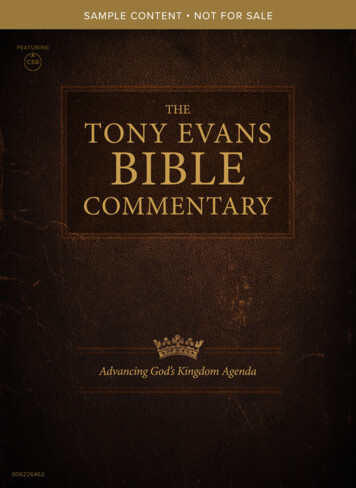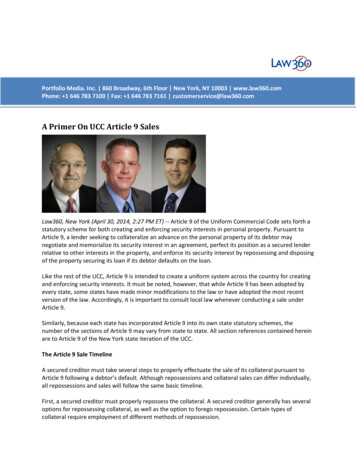
Transcription
SAMPLE CONTENT NOT FOR SALE006226462
CONTENTS2.A BOUT THE COMMENTA RY3.A BOUT DR . TONY EVA NS4.AVA ILA BLE EDITIONS6.INTRODUCTION7.HOW TO STUDY THE BIBLE9.SA MPLE FROM M ATTHEW
The Tony Evans Bible Commentary includes an introduction to each Biblebook followed by passage-by-passage exposition of the entire Bible by Dr.Tony Evans. In addition, there is a special front matter section with introductoryresources. The insights in this commentary will help explain God’s Word in afresh way. Applying these truths will empower readers to have transformedlives that then transfer the values of the kingdom of God to others.This Bible also includes video resources from Dr. Evans—such as introductionsto the books of the Bible and Kingdom Agenda videos—which you can viewby scanning a QR code or typing in the provided web address.2
A BOUTDR. TONY EVANSDr. Tony Evans is the founder and senior pastorof Oak Cliff Bible Fellowship in Dallas, is thefounder and president of The Urban Alternative,served as chaplain of the NBA’s Dallas Mavericksand the NFL’s Dallas Cowboys, and is the authorof over 100 books, booklets, and Bible studies.The first African American to earn a doctorate oftheology from Dallas Theological Seminary, hehas been named one of the 12 Most EffectivePreachers in the English-Speaking World byBaylor University. Dr. Evans holds the honorof writing and publishing the first full-Biblecommentary and study Bible by an AfricanAmerican. His radio broadcast, The Alternativewith Dr. Tony Evans, can be heard on morethan 1,400 US outlets daily and in more than130 countries.Dr. Evans launched the Tony Evans TrainingCenter in 2017, an online learning platformproviding quality seminary-style courses for afraction of the cost to any person in any place.The goal is to increase biblical literacy and toadvance God’s kingdom agenda. Dr. Tony Evansis married to Lois, his wife and ministry partnerof over 50 years. They are the proud parentsof four, grandparents of thirteen and greatgrandparents of two.F O R M O R E I N F O R M AT I O N , V I S I TTO N Y E VA N S . O R G3
R ELEASE DATE: 10/1/19ISBNBINDING MATERIALPRICE978-0-8054-9942-1Hardcover 44.99978-0-8054-9943-8epub 24.994
5
This commentary is based on a simple yetprofound biblical worldview: the glory ofGod through the advancement of his kingdom. This is the unifying theme of Scripture, from Genesis through Revelation.The concept of God’s kingdom is what tiesall of the Bible together. When this centralpoint of connectivity is lost to the reader, itis easy for Scripture to seem like a series ofdisconnected stories, events, personalities,and doctrines that do not strategically andthematically connect to one another.The word kingdom means “rule” or “authority.” When linked to God, it refers to therule of God in both heaven and earth encompassing both eternity and time. It is thereforecomprehensive in nature. This kingdom iscomposed of a ruler (God), subjects (angelsand people), a realm (creation), and regulations (laws).The Bible unfolds how God’s kingdomGod receives glory through his kingdom rule,even when that rule is being opposed by bothangels and human beings. While God’s kingdom rule takes various forms with varyinglaws through varying administrations (i.e.,dispensations), it nonetheless maintains itscentral goal of bringing God glory whetherthrough blessing or judgment.The kingdom agenda, then, is the visiblemanifestation of the comprehensive rule ofGod over every area of life. God’s kingdomagenda is carried out through four covenantal spheres: the individual, the family, the church, and the government (i.e.,nations). A covenant is a divinely createdrelational bond through which God administrates his kingdom program. It establishesa legal relationship in the spiritual realmthat is to be lived out in the physical realm.To operate and function underneath theumbrella of God’s kingdom covenants andguidelines is to position the specific covenantal relationship (i.e., individual, family,church, government) to experience God’sgreatest involvement and benefits withinthat covenantal sphere. Conversely, to operate outside of and in opposition to God’skingdom covenant is to experience the negative consequences of not being aligned andcovenantally covered.This commentary is designed to reflectthis kingdom perspective through an exposition of each of the sixty-six books of theHoly Scriptures. My goal is that this workwill serve as a valuable study resource forserious students of the Bible by combiningexegesis, exposition, and exhortation thatcreates a relevant kingdom mindset.As you use this study tool, remember:Study the Scriptures with a view tomeeting with God, not just learningabout him.Study the Scriptures by routinelyasking, “What should I do in light ofwhat I have learned?”Study the Scriptures in their contextin order to be accurate in yourunderstanding of what the biblicalauthors are saying.Study the Scriptures in prayer andin dependency on the Holy Spirit toopen up your mind and heart to themeaning and contemporary relevancyand application of the text.Study the Scripture with a kingdommindset, seeking to identify God’s ruleover every area of life.While nothing can be added to or subtracted from God’s inerrant Word, it is my sincerehope that this tool will aid you in your understanding and application of the Bible toyour life. For additional study notes, articles,and supporting materials, see also The TonyEvans Study Bible: Advancing God’s KingdomAgenda. Most importantly, it is my prayerthat your reading, studying, and obedience tothe written Word will lead you into a deeper,more intimate relationship with the livingWord, Jesus Christ, as kingdom disciples asyou live all of life under his kingdom rule.6
The Bible is a book unlike any other book. Itis, in fact, a whole library of books, all boundtogether in one volume. These individualthors over an extended period of time. Whatmakes the Bible so unique, though, is that itsmany human authors were all inspired by itsone divine author—God himself! The Greekword Paul uses for “inspired by God” means“God-breathed.” These words that carry God’sbreath are words that can change and transform our lives. Paul reminds us that all ofScripture “is inspired by God and is profitablefor teaching, for rebuking, for correcting, forIf we want to understand who God is,what his purposes are, and how he hasmade Himself known to the human race,ever you purchase a complicated gadget itis usually accompanied by a set of instructions—a manufacturer’s handbook. Withoutthis handbook you’ll find yourself having toguess at how it works. In a sense, the Bible isthe “manufacturer’s handbook” for life. Theone who created us has plans and purposesfor us. If we don’t know the content of hismanufacturer’s handbook, we won’t knowhis plans and purposes, nor will we knowhow to live as he intends.reading the Bible. Sometimes the problem isjust laziness or a wrong set of priorities. Butthat isn’t the only reason. The Bible can be aimportant teachings are understandable by achild, there is much in the pages of Scripturethat is not easy to grasp without some extraThat’s where a study Bible comes in handy.It will provide you with some backgroundmaterial and theological explanation thatwill bring biblical truths into sharper focus.But don’t count on the study Bible to do all thework for you. If you want to get the most outof the Scripture you need to learn to read itfor yourself and learn to interpret it by givingcareful focus to the passage you are readingand by comparing what you learn there withthe rest of what the Bible teaches.7What follows are some things you can doto help you get the most out of your biblicalstudy.Though the Bible is an exciting book, youcan’t read it in the same way you’d read athrilling novel. If you race through the pagGood Bible reading begins with reading slowly and carefully, and it is a good idea to have apen and paper handy to jot down the thingsyou observe. Or maybe you’ll want to writein the margins of your Bible. Mark down thethings that inspire, challenge, or puzzle you. Ifthere is a key verse or key idea you discover,you might want to underline it. You can makea study Bible your own by recording in it thethings you are learning from it.As you read, pay close attention to wordslike if, then, and therefore, which will helpyou understand the relationships betweenthe concepts it teaches. These little wordsmay reveal requirements and expectationsthat you need to keep in mind. Many of theBible’s promises, for example, are conditional. There are things you are expected to do ifthat promise is to become real in your life.And in the New Testament letters, the wordtherefore is often a signal that what went before is the doctrinal basis on which a truthcan be embraced and applied.Read and read again. You might even tryreading aloud as a way of forcing yourself toslow down and take in every thought. Aboveall, don’t be in a hurry. Read slowly and thinkabout what each sentence and paragraphmeans. Don’t just hunt for an inspiring nugget of truth. Let every sentence speak to you!One of the common characteristics of children is that they are almost insatiably curious. They ask lots of questions, which can
sometimes become exhausting for their parents. But it is the way they learn new things.One of the problems with adults is that theyoften stop asking questions as they grow older. So be more like a curious child as you readthe Bible. Don’t assume you already knowwhat it says. Keep your curiosity high andkeep your heart and mind open. One greatway to do this is by cross-examining the passage you are reading in order to make sureyou are noticing all it has to say. See if you cananswer these questions: who, what, where,when, why, and how? Exploring the answersto these questions will open new depths ofunderstanding.Paying attention to context is extremelyimportant if you want to accurately understand what the Bible is saying. Some peoplejust search its pages for an individual versethat speaks to their need of the moment,without paying much attention to the verses that surround it. Reading this way is liketreating the Bible as a fortune cookie or asa collection of inspirational memes. As youread the Bible, sometimes a verse will standout and engage your heart in a very personalway. But when that happens, it’s importantto see how that verse relates to the versesaround it. If you don’t pay attention to thecontext, you are in danger of trying to makethe Bible say something that it doesn’t actually say.Every verse of the Bible is part of a chapter, and every chapter is part of a book, andevery book of the Bible is part of one largerGod-inspired message that unfolds acrossits pages. Many people don’t realize that theBible wasn’t originally written in chaptersand verses. Each book was one continuoustext contained in a scroll, and it was not untilthe late Middle Ages that someone came upwith the idea of dividing it into chapters andverses to make it more convenient for readers and as a tool for helping people locatespecific passages they wanted to remember.You should keep that in mind before pullinga verse out of its context and applying it toyour life.As you read, pay attention to the immediate context of the neighboring verses and tryto understand the main point that the biblicalwriter is making. Ask yourself how it fits inthe context of the entire book. You shouldnotice if the passage you are reading is partof a larger story or a larger argument andwho is speaking or being spoken to. Thereare, for example, places in the Bible that contain the words of Satan or of a godless leader,and we don’t want to treat those in the sameway we’d treat the words of Jesus!As we study the Bible, it is important tokeep our focus upon the main points andthe most important teachings, and not allow ourselves to be sidetracked too much bysecondary issues. Make sure you understandthe big picture through your telescope beforeyou pull out your microscope to examine thedetails! The Bible isn’t a puzzle book or a coded message, so don’t look for complicatedsymbols and secret meanings. Ask yourselfwhat it meant to the original readers andhow that applies to you today.Applying what we read in the Bible to our daily lives is the highest purpose of Bible study.We don’t study it so that we can win theological arguments or impress people withour knowledge. We read it so that God canuse it to transform our lives. Therefore, weshould read the Bible with humility and anopen heart, being ready to be challenged andchanged by God’s Word. We should read itwith an open mind, not assuming we alreadyknow what it means. The more you read theBible, the more new and fresh truths you willdiscover in its pages. It is inexhaustible.The Bible speaks with God’s own authority,so the proper response to such authority isis a mirror in which we can catch an honestglimpse of ourselves. As you read, you canperceive where you are falling short, whereyou are making improper compromises,where you are following your own desires instead of God’s best, and where you are placingyour cultural prejudices over God’s truth. So,as you read Scripture, hear—and then obey.8
AAuthoridentify himself by name in thetext, the title of this Gospel in-existing manuscripts. In addition, severalearly church fathers (including Papias, Ireoriginally wrote the Gospel in Hebrew (whatwe have today is in Greek).Many critical scholars today deny thatlike it was translated from Hebrew. If Papiaswas wrong about that, they argue, he wasprobably wrong about who wrote it. But therebe a Greek translation from Hebrew. Regardless, it wouldn’t necessarily mean Papias waswrong about authorship. The early churchunanimously claimed that the apostle Matthew penned the Gospel that bears his name.There is also internal evidence to supportthis—that is, evidence within the Gospelitself. Mark 2:14 and Luke 5:27 call the taxcollector who became a disciple “Levi.” Inidentified as a tax collector, and it may bethat he had two names like Simon / Peter.Though we can’t be absolutely certain, it isbest to trust the testimony of the early church9BackgroundMost—though not all—scholars todayas one of his sources when composing his50s (see Background discussion on Mark’s50s. The church father Irenaeus, who wrotein the late second century, claimed that Matthew wrote his Gospel while Paul and Peterwere preaching in Rome. This would havebeen in the early 60s.Message and Purposewrite the Gospel that bears his name, andits subject is very simple: it’s about the Kingespecially to Jews, the message that God hassent his King, his Messiah, who would rule ashis regent on earth by offering the kingdomculmination of all the Old Testament’s anticipation of the Messiah who would come.The apostle’s concern was giving convincing proof that Jesus was the messianic Kingwhom the Jews were anticipating and whomthe world needs so desperately. That’s why
he began with Jesus’s genealogy to estabalso presented Jesus’s kingdom discourses,teaching, and miracles as proof of his messianic claim.The book winds to a disquieting moment,the crucifixion. If Jesus is the Messiah, howcould he be put to death? Thankfully, thescene is followed by the resurrection andthe announcement that the King is alive andcoming back, and that his kingdom is in thisworld today. Jesus’s Great Commission at theas believers today.www.bhpublishinggroup.com/qr/te/40 00OutlineGenealogy, Birth, and Childhood(1:1–2:23)Baptism, Temptation, and the Startof Ministry (3:1–4:25)The Sermon on the Mount (5:1–7:29)Healings and Miracles (8:1–9:38)Sending Out the Twelve (10:1-42)Confusion and Opposition (11:1–12:50)Parables about the Kingdom (13:1-58)Spreading Ministry and GrowingOpposition (14:1–17:27)Greatness, Restoration, andForgiveness (18:1-35)Ministry on the Way to Jerusalem(19:1–20:34)Ministry in Jerusalem (21:1–23:39)The Olivet Discourse (24:1–25:46)Suffering, Crucifixion, and Death(26:1–27:66)Resurrection and Great Commission(28:1-20)10
The apostle Matthew opens his Gospel account with a genealogy of Jesus Christ, theson of David, the Son of Abraham. Manypeople tend to skip over this record and theone in Luke, but that’s a mistake. These genealogies demonstrate that Jesus had a legitimate legal claim to be the Messiah—theSon of David and heir to the throne (see 2 Sam7:12-16; Isa 11:1-10). Though Jewish genealogical records would be destroyed in AD 70when Jerusalem fell to the Romans, Jesus’sgenealogy was supernaturally preserved inthe Gospels.Matthew’s genealogy reaches back toAbraham (1:2) and proceeds through KingDavid (1:6) to reach Jesus’s assumed father,Joseph (1:16). There’s a problem, though,with Jeconiah (1:11)—also known as Jehoiachin and Coniah (see 1 Chr 3:16; 2 Chr 36:8-9;and Jer 22:24). According to Jeremiah, Jeconiah would not have a biological descendentsitting on David’s throne because of his ownsins (Jer 22:30).So, although Joseph had a legal right tothe throne, because of Jeremiah’s prophecy, it would never happen biologically. Thus,Matthew makes it clear that Joseph is notJesus’s biological father but his adoptive father, who was the husband of Mary (1:16).Interestingly, Luke provides Jesus’s genealogy through her (Luke 3:23-38). This showsthat Jesus is related to David biologicallythrough David’s son Nathan (Luke 3:31).Therefore, he’s related to David on bothsides of the family tree. And because hisbiological relationship is through Nathan11and not through Jeconiah, he can sit on thethrone.Notice that Jesus’s genealogy is filled withimperfect people. Jacob (1:2) was a deceiver.David (1:6) committed adultery and murder.Solomon (1:7) took an abundance of wivesand concubines. Manasseh (1:10) was oneof Judah’s most wicked kings. Moreover, andwhile women do not normally show up ingenealogies, the women in Jesus’s line wereparticularly questionable. Tamar (1:3) wasa Canaanite who posed as a prostitute. Rahab was a prostitute; Ruth was from Moab,a non-Israelite people that worshiped falsegods (1:5). Another observation about Jesus’sgenealogy is that it is mixed racially, including both Jews and Gentiles and indicatingthat Jesus’s kingdom identity and rule includes all races of people.All of this points to God’s sovereign grace.He accomplishes his glorious purposes inacter of the people involved. If he can use thepeople listed in 1:2-16 to bring the Christ intothe world, God can surely use you too.Notice also that of the five women mentioned in Matthew’s genealogy, four are ofHamitic descent: Tamar, Rahab, Bathsheba,and Ruth. That doesn’t mean that Jesus wasblack. To assert such, as some black theologians and religious leaders do, is to fall intothe exclusionist perspective of many whites,who would make Jesus an Anglo-European,blue-eyed blond with little relevance to people of color. It would also fail to respect thedistinct Jewish heritage of Christ. Jesus wasa person of mixed ancestry.
It blesses me to know that Jesus had blackin his blood because this destroys any perception of black inferiority once and for all.In Christ we find perfect man and sinlessSavior. This knowledge frees blacks from aninferiority complex, and at the same time itfrees whites from the superiority myth. InChrist, we all have our heritage.Black people, as all other people, can finda place of historical, cultural, and racial identity in him. As Savior of all mankind, he canrelate to all people, in every situation. In him,any person from any background can findity—as long as Christ is revered as the Sonof God, a designation that transcends everyculture and race and one to which all nationsof people must pay homage.In biblical times, a marriage in theOrient included several stages. The betrothalor engagement period was not like our modern engagements. The engagement of Josephand Mary was a legal contract, as binding asmarriage. So when Joseph discovered thatMary was pregnant, he decided to divorceher secretly. He was a righteous man andthought she had committed adultery, but hedidn’t want to disgrace her publicly (1:19).Before Joseph could carry out his plans,though, an angel of the Lord appeared tohim in a dream. Angels are divine messengers, and one of the ways they carry out theirrole in Scripture is by faithfully deliveringGod’s message to humans. This angel told Joseph to take Mary for his wife because thechild conceived in her was from the HolySpirit.God has created laws (such as the law ofgravity) that govern the universe. When heintervenes in the regular course of events,interrupts those laws, and demonstrates hispower over creation, a miracle takes place.This would be the most unique birth in history because Mary had never been touchedby a man. A virgin would miraculously givebirth because of the activity of the HolySpirit.Even so, this miracle involved more, forhers wasn’t just any baby. The greatest miracle in human history occurred when Godbecame man. The eternal Son of God took onhuman flesh, combining full deity and fullhumanity in one person. Jesus Christ is theGod-man.They were to call their son Jesus, aGreek name corresponding to the Hebrewname Joshua, which means “the Lord saves.”Thus, according to the angel, the child’s namewas to indicate the reason he had come intothe world—that is, he will save his peoplefrom their sins (1:21).Matthew doesn’t want his readers to thinkthese are unexpected events; instead, theyare a fulfillment of Old Testament prophecy(1:22). Mary was part of a plan that God hadbeen orchestrating for centuries. Long before, Isaiah had prophesied, The virgin will. . . give birth to a son, and they will namehim Immanuel. And Immanuel, Matthewtells us, means, God is with us (1:23). Thatis the essence of Christmas. The baby in themanger was God himself in the person of hisSon. He was deity in a diaper. Heaven wascoming down to earth; eternity was invading time. The King of the universe had cometo be with us (see John 1:14) and save sinners(Matt 1:21).All the problems in this world can betraced back to sin, and the Son of God cameto save you from your sins because youcouldn’t save yourself. Jesus Christ enteredthe world to identify our sins, forgive us forour sins, give us victory over our sins, andgive us an eternal home free from sin. Thattruth is what Christmas is all about. If youmiss that, you’ve missed the point.When Joseph awoke, he did as the angel had commanded him (1:24). Again, hewas a righteous man (1:19). So, when he understood what God was doing, he compliedin full obedience. He did not have sexualrelations with Mary until she gave birth:Jesus was to be born of a virgin (1:25).After Jesus was born in Bethlehem. . . wise men arrived. There are two common misconceptions to clear up aboutthese visitors. First, according to legend,there were three wise men. However, weonly know that they brought three specificgifts (2:11). We don’t know how many menthere were.12
Second, contrary to how the scene is oftenportrayed, the wise men weren’t present atthe nativity. They weren’t there for Jesus’sbirth. By the time they arrived, Joseph andMary were living in a house (2:11). In addition, as we’ll see, Herod sought to kill all themale children two years old and younger(2:16); therefore, Jesus was a toddler whenthe wise men saw him, not a baby.Matthew tells us their origin was fromthe east (2:1)—perhaps Babylonia or Persia.They were looking for the king of the Jews,had seen his star, and had come to worshiphim (2:2). The Greek term for these men ismagi. They were astrologers—students ofthe heavenly bodies. Whatever religiouspractices they’d engaged in previously, whenthey saw the manifestation of God’s glory inthe heavens, they responded and traveled toworship the true King.They entered Jerusalem (the obviousplace to find a king) and went to the palace ofKing Herod, also known as Herod the Great.Herod wasn’t a Jew. He was an Idumeanwhom the Romans had made a ruler of theJews. So when he heard what the wise menhad to say, he was deeply disturbed (2:3). Asfar as he was concerned, there was no roomfor any king but him.Herod asked the chief priests andscribes to tell him where the Christ wouldbe born (2:4). And while these leaders clearly knew the Scriptures, they never pursuedthe Savior (see John 5:39-40). They didn’t acton what they studied. Nevertheless, whenHerod learned that Scripture foretold thatthe Messiah would be born in Bethlehem(2:5-6; see Mic 5:2), he secretly summonedthe wise men (2:7). He told them he also desired to worship and asked them to searchcarefully for the child and report back(2:8). But Herod had ulterior motives. Hewasn’t about to let anyone take away hiskingdom.The wise men continued theirsearch, following the star until it stoppedabove the place where the child was (2:9).Whereas Herod was deeply distressed overthe news of a new king, the wise men wereoverwhelmed with joy to see him (2:10).They fell on their knees before the child13and gave him gifts of gold, frankincense,and myrrh (2:11).True worship can’t be contained. Thesemen had traveled an incredible distance forperhaps as long as two years to worship thisKing, but they knew he was worth the journey. How much are you willing to be inconvenienced to worship the King of kings? Howbadly do you want him?Since they had faithfully sought theSavior, the wise men received inside information. They were warned in a dream aboutHerod and returned home by another route(2:12). Joseph also—since he had obeyedthe Lord’s word (1:24-25)—received furtherinformation and understanding. An angelwarned him to flee to Egypt with Mary andJesus for safety from Herod (2:13). When youobey God’s revelation you get further divineillumination for your destination.Joseph took the child and his mother and escaped to Egypt where they’d besafe until Herod died (2:14). Matthew tellshis readers that this was to fulfill what wasspoken by the Lord through the prophetHosea: Out of Egypt I called my Son (2:15).In his prophecy, Hosea was talking aboutIsrael, whom God called his son and delivered from Egypt (see Hos 11:1), but Matthewunderstood that Israel was a type of God’sSon who was yet to come. A type is a historical person, institution, or event that pre-figures a future corresponding reality. Thus, asGod called his son Israel out of Egypt, so hewould call his true Son out of Egypt. Matthewknew that many Old Testament texts pointforward to Jesus.When he realized that he hadbeen outwitted by the wise men, Heroddisplayed his true, murderous colors. He ordered the massacre of all the boys in andaround Bethlehem who were two yearsold and under. He used the informationlearned from the wise men—which theyhad learned by divine illumination—toslaughter innocent children (2:16). Matthewrecognized this as another fulfillment ofprophecy—this time from Jeremiah (2:17).Here too there is a connection between Israel and their Messiah. As Israel wept in
Jeremiah’s day for their children in exile(see Jer 31:15-16), so they wept again inMatthew’s day for their children who werepersecuted in connection to Jesus.After Herod’s death, God once againcommunicated to Joseph in a dream to takethe child and his mother back to Israel(2:19-21). When Joseph heard that Archelaus, Herod’s son, was ruling over Judeain his father’s place, he was afraid to go tothere. But God addressed his fears and senthim to Galilee (2:22).All four Gospels testify to the ministryof John the Baptist (3:1). He was the frontman for Jesus, the one who came to prepare his way. John came preaching in thewilderness of Judea and calling people torepent (3:1-2). Here Matthew quotes Isaiahwho prophesied that this voice . . . in the wilderness would come to prepare the way forthe Lord (3:3).The wilderness (then and now) is not aplace of comfort and excitement. It’s a barrenplace of preparation and development forwhat God is planning to do. John preached arevival in the wilderness, essentially tellingthe people, “The Messiah is coming, so you’dbetter get ready!” Repentance is essential forexperiencing the presence and grace of God.It involves changing the mind in order to reverse direction. It is the inner resolve and determination to turn from sin and turn to God.So what’s the motivation for repenting? Thekingdom of heaven has come near (3:2).John wanted people to know that the Kinghad arrived, and his promised earthly kingdom was ready to burst on the scene. Heavenhad come to visit earth.John’s austere lifestyle, odd wardrobe, and confrontational preaching werereminiscent of another of God’s messengers: Elijah (see, for example, 2 Kgs 1:3-17).As the people from Jerusalem and Judeaheard John’s message, they were baptizedby him and confessed their sins (3:5-6). ToThere the family settled in the townof Nazareth and thus it was fulfilled thatJesus would be called a Nazarene. Actually, though, such a statement is not foundin any of the Old Testament prophets. Solikely Matthew was thinking of statementslike Isaiah 53:3: “He was despised and rejected by men” (see also Ps 22:6; Isa 49:7),because Nazareth was viewed as a despisedcommunity from which no good thing couldcome (see John 1:46). God sovereignly wovehis plan in history to bring the Messiah intothe world.confess means to agree with. So by confessing their sins and being baptized, the people were making a public declaration thatthey had changed their minds and agreedwith what God said about their sins. If youwant to experience heaven’s visitation inyour history, true repentance can get youthere.The Jewish religious leaders, thePharisees and Sadducees, also came tohear John. But they got an earful when hecalled them a bunch of venomous snakes(3:7)! Why did John accept other people butnot this group? Because, although they wereOK with listening to his message, they wanted their lives left alone. Like some peopletoday, they didn’t mind attending a churchinformation, but not transformation. That’swhy John challenged them to prod
Evans launched the Tony Evans Training Center in 2017, an online learning platform providing quality seminary-style courses for a fraction of the cost to any person in any place. The goal is to increase biblical literacy and to advance God's kingdom agenda. Dr. Tony Evans is married to Lois, his wife and ministry partner of over 50 years.











